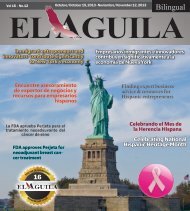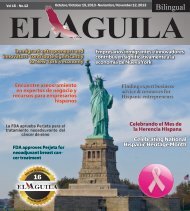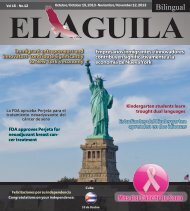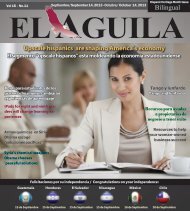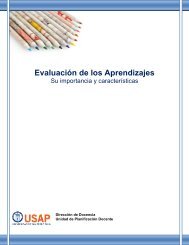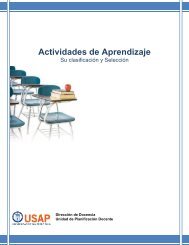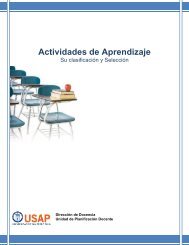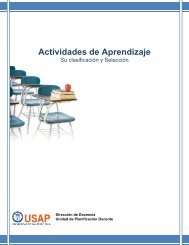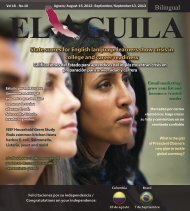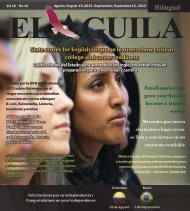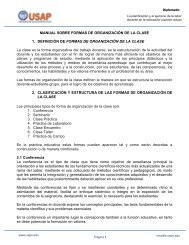REVISTA-AGOSTO-SEPTIEMBRE2013
Create successful ePaper yourself
Turn your PDF publications into a flip-book with our unique Google optimized e-Paper software.
8 Agosto/August 15, 2013 - Septiembre/September 13, 2013<br />
Por Dr. Anthony T. Minotti y María Elena García<br />
Carullo<br />
Si no lo han hecho todavía, al acercarse al final<br />
de sus estudios de la escuela secundaria y comienzan<br />
a pensar en su futuro, deben incluir<br />
en su pensamiento el que saben dos idiomas. Esto<br />
les abrirá muchas puertas y les dará una ventaja sobre<br />
otros candidatos en casi todos los campos de trabajo<br />
en su búsqueda de trabajo.<br />
El último censo de los Estados Unidos del 2010 indicó<br />
que había 50.5 millones de latinos en los Estados<br />
Unidos o el 16% de la población total, un aumento<br />
de 3% desde 35.5 millones en el 2000. En el<br />
2011, los niños latinos inscritos en la educación prekindergarten<br />
– Grado 12 eran 23.9% de las inscripciones<br />
escolares totales. La población latina es la<br />
mayor de cualquier minoría, y se espera que llegue<br />
a 132.8 millones para el 2050 o 30% de la población<br />
total de los Estados Unidos.<br />
Con esta población latina grande y creciente, hay<br />
necesidad de empleados bilingües en todos los<br />
campos. Piense en su día: el noticiero de la mañana<br />
en la tele o en la radio, el conductor del autobús<br />
o el encargado del estacionamiento, recepcionistas<br />
de edificios y oficinas, ascensoristas, trabajadores<br />
de servicio de alimentos, personal de tiendas de comestibles,<br />
personal de almacenes, trabajadores de<br />
estéticas, profesionales de la salud, personal de la<br />
escuela, funcionarios públicos, bomberos, policías<br />
y otro personal municipal – y hay muchos más. En<br />
resumen, se necesitan trabajadores bilingües para<br />
apoyar a los hispanohablantes en todas las áreas de<br />
la vida diaria.<br />
Ser bilingüe es un recurso muy importante que requiere<br />
un poco de esfuerzo para mantenerlo. Como<br />
el idioma del hogar, el español será el primer idioma<br />
del estudiante, pero el inglés eventualmente se<br />
hará su idioma dominante. Al ir adquiriendo competencia<br />
en el inglés, la capacidad de comunicarse<br />
en español no debe ser dejada de lado. A menudo,<br />
EL AGUILA<br />
La ventaja bilingüe<br />
La población latina es la mayor de cualquier minoría, y se espera que llegue a 132.8 millones para el 2050<br />
o 30% de la población total de los Estados Unidos.<br />
al ir desarrollando su conocimiento del inglés, no<br />
quieren seguir hablando español – sea que les dé<br />
vergüenza; sea que no quieren que sus amigos se<br />
burlen de ellos; sea que no quieren ser identificados<br />
como ¨diferentes¨ o ¨extranjeros¨.<br />
Para beneficiarse de la ventaja bilingüe, hay muchas<br />
cosas que pueden hacer los estudiantes latinos<br />
para mantener el español que ya saben y expandir<br />
su conocimiento. La meta debe ser desarrollar un<br />
conocimiento del español lo más sólido que sea posible<br />
– no sólo saber unas pocas palabras aquí y allá<br />
sobre tal o cual tema, sino desarrollar un dominio<br />
sólido que incluya hablar y escribir bien con un vocabulario<br />
general amplio y vocabulario especializado<br />
para la carrera que hayan escogido.<br />
Una manera fácil de lograr esto es tomar cursos de<br />
español en la escuela secundaria y la universidad y<br />
de veras hacer el trabajo del curso – algunos estudiantes<br />
latinos toman el español como un curso fácil,<br />
no hacen las tareas como piensan que ¨saben el<br />
español¨, y terminan con una nota mínima para pasar<br />
raspando, igual que un conocimiento mínimo.<br />
Algunas profesiones, tales como la profesión mé<br />
dica, conscientes del valor de que sus practicantes<br />
sepan el vocabulario del campo, están creando cursos<br />
en sus instituciones para sus miembros; los latinos<br />
sin duda deben aprovecharse de las oportunidades<br />
que ofrecen estos cursos. Para el vocabulario<br />
especializado de una profesión, también hay muchos<br />
diccionarios en línea y sitios web con glosarios<br />
que se pueden consultar. El estudiar el español<br />
no sólo enseñará los aspectos técnicos del idioma<br />
sino que expandirá los conocimientos del estudiante<br />
de su cultura porque la lengua y la cultura son inseparables.<br />
The bilingual<br />
advantage<br />
By Dr. Anthony T. Minotti and Maria Elena Garcia<br />
Carullo<br />
Most Latino high school students are so busy<br />
being teenagers that they do not realize a<br />
tremendous advantage they have: they are<br />
bilingual!<br />
If they have not done so already, as they approach the<br />
end of their high school studies and begin thinking of<br />
their future, they should include in their thinking that<br />
they know two languages. This will open many doors<br />
for them and give them an edge over other candidates<br />
in almost every job field as they look for work.<br />
The latest US Census in 2010 indicated that there were<br />
50.5 million Latinos in the United States or 16%<br />
of the total population, up 3% from 35.5 million in<br />
2000. In 2011, Latino children enrolled in PreK-Grade<br />
12 education were 23.9% of total school enrollments.<br />
The Latino population is the largest of that of<br />
any minority, and it is expected to reach 132.8 million<br />
by 2050 or 30% of the total US population.<br />
With this large and growing Latino population, there<br />
is need for bilingual employees in every field.<br />
Think of your day: the morning news on television<br />
or the radio, the bus driver or parking lot attendant,<br />
receptionists at buildings and offices, elevator operators,<br />
food service workers, grocery store personnel,<br />
department store personnel, beauty care workers,<br />
health care professionals, school staff, civil servants,<br />
fire, police, and other municipal personnel – and there<br />
are many others.<br />
In short, bilingual workers are needed to support Spanish-speakers<br />
in every area of daily living.<br />
Being bilingual is a very important asset that requi-<br />
Educación<br />
Education<br />
res some effort to maintain. As the language of the<br />
home, Spanish will be the student´s first language,<br />
but English will eventually become his/her dominant<br />
language. As the student acquires proficiency<br />
in English, the ability to communicate in Spanish<br />
should not be pushed aside. Often, as Latino students<br />
develop their knowledge of English, they do not want<br />
to speak Spanish anymore – they may be ashamed;<br />
they do not want their friends to make fun of them;<br />
they do not want to be identified as ¨different¨ or ¨foreign¨.<br />
In order to benefit from the bilingual advantage, there<br />
are many things Latino students can do to maintain<br />
the Spanish they already know and expand their<br />
knowledge. The goal should be to develop as strong<br />
a knowledge of the language as possible – not just to<br />
know a few words here and there on this or that topic,<br />
but to develop a strong command that includes<br />
speaking and writing well with a broad general vocabulary<br />
and specialized vocabulary for their chosen<br />
career.<br />
An easy way to achieve this is to take Spanish courses<br />
in high school and college and really do the work<br />
of the course – some Latino students take Spanish as<br />
an easy course, do not do the assignments since they<br />
think they ¨know Spanish¨, and end up with a minimal<br />
passing grade, as well as minimal knowledge.<br />
Some professions, such as the medical profession,<br />
aware of the value of having their practitioners know<br />
the vocabulary of the field, are creating courses onsite<br />
for their members; Latinos should certainly take<br />
advantage of the opportunities these courses offer.<br />
For the specialized vocabulary of a profession, there<br />
are also many online dictionary and glossary websites<br />
one can consult. Studying Spanish will not only<br />
teach the technical aspects of the language but will also<br />
expand the student´s knowledge of his culture because<br />
language and culture are inseparable.<br />
La mayoría de los estudiantes latinos de la escuela secundaria están tan ocupados siendo adolescentes que<br />
no se dan cuenta de una tremenda ventaja que tienen: ¡son bilingües!



